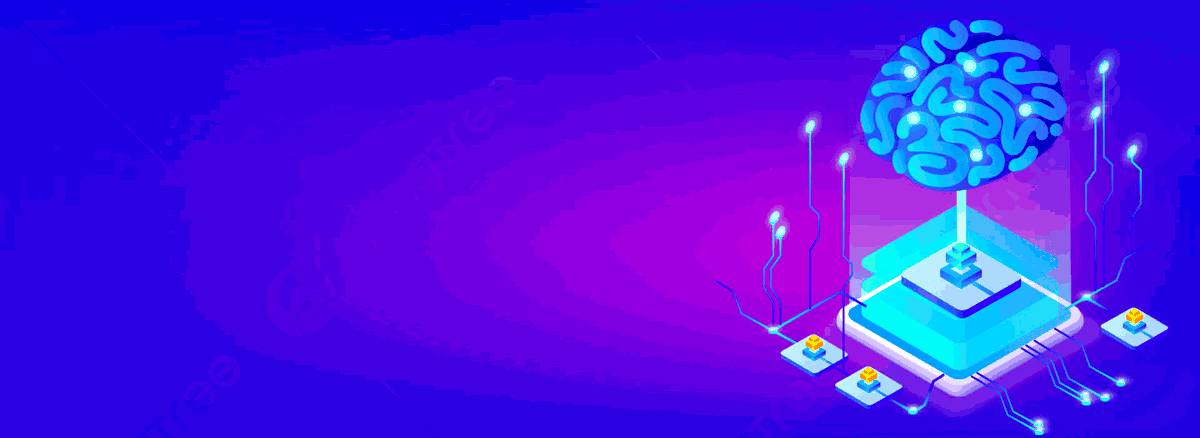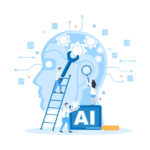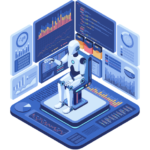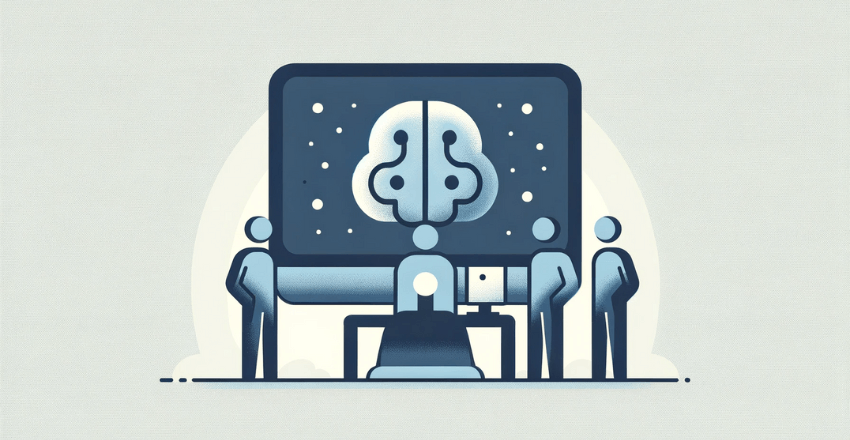 How to Manage an AI Development Team effectively: Discover key strategies for leading tech innovators, fostering collaboration, and driving groundbreaking AI projects to success.
How to Manage an AI Development Team effectively: Discover key strategies for leading tech innovators, fostering collaboration, and driving groundbreaking AI projects to success.
Managing an AI development team requires effective leadership and technical expertise to drive successful project outcomes. As the demand for AI continues to grow, managing an AI development team has become a critical skill for businesses looking to remain competitive.
Effective AI team management involves fostering collaboration, providing technical guidance, setting clear goals and expectations, and nurturing continuous learning and innovation.
Key Takeaways
- Effective leadership is crucial for managing an AI development team.
- Technical knowledge and expertise are essential for managing AI engineers.
- Building a strong AI development team involves recruiting top talent and fostering collaboration.
Understanding the Role of an AI Development Manager
Managing AI engineers is a critical task that requires a unique set of skills and expertise. An AI development manager must be capable of leading a team of talented professionals to deliver high-quality work within challenging timelines.
In addition, an effective AI development manager should have a solid understanding of emerging technologies and market trends, in addition to possessing strong leadership qualities.
One of the primary responsibilities of an AI development manager is to oversee the development of complex AI software and applications. They must ensure that the team is working in alignment with project requirements, and providing necessary guidance and support to the team whenever required. As the point of contact between team members and upper management, an AI development manager should have excellent communication skills and be capable of conveying project updates and progress effectively.
Managing AI engineers is not just about technical knowledge. Along with ensuring the team has the necessary resources and training required for success, AI development managers must also have exceptional leadership qualities. They should possess the ability to inspire the team, encourage collaboration, and create a positive team culture.
It is essential for AI development managers to motivate and direct the team towards a common goal, while at the same time ensuring individual members’ growth and career development.
Key Skills for Managing AI Engineers
The following are some key skills that AI development managers should possess to manage AI engineers effectively:
- Technical expertise in artificial intelligence, machine learning, and data analytics
- Strong leadership and management qualities, including the ability to inspire and motivate team members
- Excellent communication skills to communicate effectively with team members, stakeholders, and upper management
- Excellent analytical skills, enabling them to assess team performance and identify areas for improvement
- Ability to balance multiple priorities, manage timelines, and ensure timely delivery of projects
- Effective problem-solving skills, enabling them to address issues as they arise and keep the project on track
Managing an AI development team requires a unique blend of technical, leadership, and management skills. An effective AI development manager should be capable of providing guidance and support to the team, inspire collaboration and growth, and lead the team towards a common goal.
Building a Strong AI Development Team

Building a strong AI development team requires careful consideration of several factors, including talent acquisition, fostering collaboration, and promoting a positive team culture.
Leading AI development teams: As the AI development manager, it is essential to lead your team effectively. You should have a clear understanding of the technical aspects of AI development, as well as the leadership skills necessary to guide and motivate your team towards success.
AI team collaboration: Collaboration is critical for any successful AI development project. It is essential to create an environment that encourages open communication, knowledge sharing, and teamwork. Regular team meetings and brainstorming sessions can facilitate collaboration and ensure everyone is working towards common goals.
Managing AI engineers: Managing an AI development team requires a deep understanding of the technical skillset required for the project. It is essential to keep your team motivated by providing mentorship opportunities, training, and access to necessary resources. Celebrating their successes and encouraging continuous learning can help to create an engaged and motivated team.
Creating a positive team culture: A positive team culture is an essential component of a successful AI development team. By fostering an environment built on mutual trust, respect, and open communication, you can create a team that is motivated, engaged, and invested in the project’s success.
Setting Clear Goals and Expectations
In managing an AI development team, setting clear goals and expectations is crucial for success. Clear project objectives, timelines, and expectations can help ensure that the team works efficiently, stays on track, and delivers results in a timely manner.
Here are some tips for setting clear goals and expectations:
- Define project objectives: It’s important to define the overall objective of the project and the specific outcomes that need to be achieved. This helps ensure that the team has a clear understanding of what they are working towards.
- Establish timelines: Setting deadlines and timelines can help keep the team focused and ensure that each member is aware of their responsibilities and what is expected of them at specific points throughout the project.
- Communicate expectations effectively: Clear communication is key to setting expectations that are understood by all team members. AI development managers should take the time to communicate expectations with each team member, ensuring that everyone is on the same page and understands their role and responsibilities.
By following these tips, AI development managers can set clear goals and expectations that help the team work cohesively towards project success.
Effective Communication Strategies
Collaboration is a critical aspect of AI development, and effective communication is fundamental to building a strong team. As a manager, it is essential to establish clear communication channels and foster an environment that encourages open dialogue.
Regular team meetings provide an opportunity to discuss project updates, share ideas, and address any concerns or roadblocks. In addition, transparent communication channels, such as messaging platforms or shared project boards, allow team members to communicate and collaborate effectively despite potential differences in location or time zone.
Active listening is another vital component of effective communication. Encouraging team members to listen actively and respectfully to each other promotes a positive team culture, where everyone feels valued and heard. It also helps to identify potential issues or challenges early on, allowing for swift resolution and minimizing delays.
Overall, establishing communication strategies that enhance collaboration and facilitate open dialogue can help foster a positive team culture and promote project success.
Providing Technical Guidance and Support
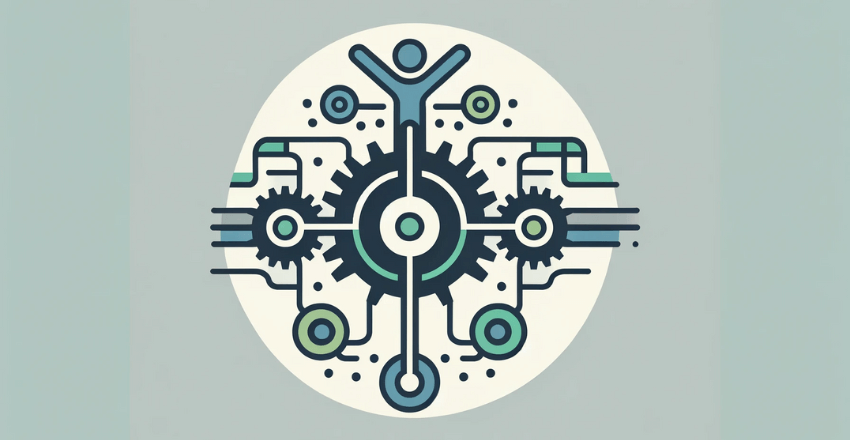
Technical guidance is an essential responsibility of an AI development manager. It is not just enough to provide direction to the team; the manager must have a deep understanding of AI technologies and tools to offer the necessary technical support and guidance.
An effective AI development manager should always be available to answer questions and provide necessary feedback. They should encourage the team to explore new ideas and approaches, and provide the necessary resources to implement them.
It is also important to identify the strengths and weaknesses of each team member and offer personalized training and mentorship to develop their skills. This approach will help to create a stronger and more versatile AI development team.
Managing AI Engineers
As an AI development manager, it is important to understand the unique challenges of managing AI engineers. AI development is a complex field that requires specialized skills and knowledge.
Effective management of AI engineers requires more than just setting goals and deadlines. It involves a deep understanding of the AI development process, technical expertise, and the ability to communicate and collaborate effectively with team members.
One effective strategy is to establish open communication channels that foster collaboration and knowledge sharing. This approach can help to minimize knowledge gaps and ensure that everyone is on the same page.
Another essential aspect of managing AI engineers is providing them with access to the necessary tools, resources, and training opportunities required to carry out their tasks efficiently. This can help to improve their productivity and prevent burnout.
| Key Takeaways: |
|---|
| Provide technical guidance: Have a deep understanding of AI technologies and tools to offer the necessary technical support and guidance. |
| Offer personalized training: Identify the strengths and weaknesses of each team member and offer personalized training and mentorship to develop their skills. |
| Establish open communication channels: Foster collaboration and knowledge sharing by establishing open communication channels. |
| Provide access to necessary tools: Provide AI engineers with access to the necessary tools, resources, and training opportunities required to carry out their tasks efficiently. |
Managing Project Timelines and Deadlines
Effective AI development team management involves ensuring projects are completed on time and within budget. Managing project timelines and deadlines is crucial to achieving this goal.
Agile Methodologies
One effective approach is to use agile methodologies, which involve breaking down project tasks into smaller, more manageable chunks. This allows the team to focus on completing smaller, achievable goals, which can ultimately lead to faster project completion. Additionally, agile methodologies allow for more flexibility in adapting to changes and adjustments in project requirements.
Prioritization
Another essential aspect of managing project timelines and deadlines is prioritization. The AI development manager should work with the team to determine the most critical tasks and prioritize them accordingly. By prioritizing important tasks, the team can ensure they are completed on time and within budget.
Balancing Workload
Balancing workload is also crucial to managing project timelines and deadlines. The AI development manager must ensure that the appropriate workload is assigned to each team member, taking into account their skills and experience. Additionally, the manager should be aware of how much work each team member has and adjust as necessary to avoid burnout or delays in project completion.
By implementing these strategies, AI development managers can effectively manage project timelines and ensure that projects are delivered on time and within budget.
Nurturing Continuous Learning and Innovation

As an AI development manager, it’s critical to foster a culture of continuous learning and innovation within your team. This means encouraging team members to stay up-to-date with the latest industry trends and technologies, and to constantly seek new solutions to old problems.
One way to nurture continuous learning is to provide opportunities for training and development. Consider offering regular workshops, webinars, and other learning opportunities that align with your team’s goals and interests. You can also encourage team members to attend conferences, meetups, and other events to learn from other professionals in the industry.
In addition to formal training, it’s important to create an environment that encourages knowledge sharing and collaboration. This could include setting up regular team meetings, brainstorming sessions, or other forums where team members can share ideas and discuss challenges.
By facilitating open communication and collaboration, you can help your team members learn from each other and stay up-to-date on the latest trends and best practices.
Promoting Innovation
In addition to continuous learning, fostering innovation is also critical for AI development teams. This means creating an environment that encourages experimentation and risk-taking, and that rewards creative solutions to complex problems.
To promote innovation, consider implementing a process for idea generation and iteration. This could involve setting up regular brainstorming sessions, hackathons, or other events where team members can pitch new ideas and work together to develop them. You can also encourage team members to experiment with new technologies or approaches, providing resources and support to help them explore new ideas.
Finally, it’s important to celebrate and recognize team members who contribute to innovation. This could involve highlighting successful projects or initiatives, or recognizing team members who come up with innovative solutions to challenging problems.
By creating a culture of innovation, you can help your team stay at the forefront of the industry and deliver cutting-edge solutions to your clients and customers.
Monitoring and Evaluating Team Performance
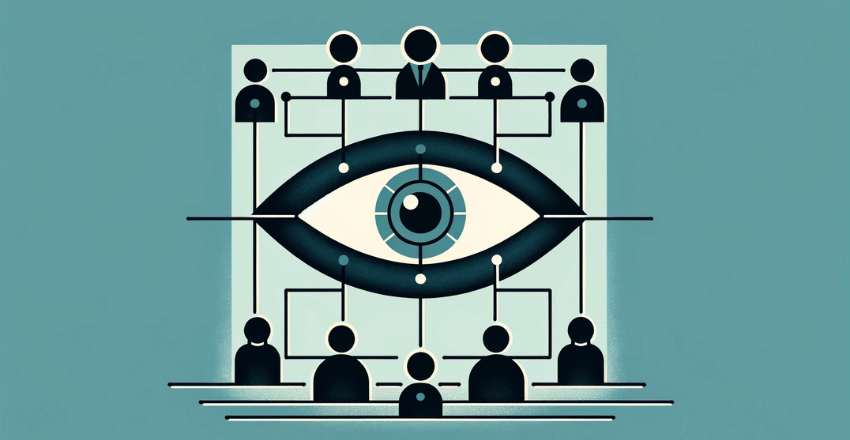
Effective AI development team management requires continuous monitoring and evaluation of team performance. This helps to identify areas of improvement and ensure that project objectives are met. Here are some methods for monitoring and evaluating team performance:
Regular Performance Reviews
Regular performance reviews provide an opportunity to assess individual contributions and identify areas for improvement. Feedback should be provided in a constructive manner, focusing on actions that can be taken to improve performance. It is important to set clear expectations and provide specific examples of behaviors that need to be modified.
Feedback Loops
Feedback loops should be established to ensure that team members receive ongoing feedback on their performance. This creates a culture of continuous improvement and encourages team members to take ownership of their work. Feedback should be provided in a timely manner and be specific to the task or project being evaluated.
Data-driven Analysis
Data-driven analysis can be used to identify patterns and trends in team performance. Metrics such as project completion rates, quality of work, and adherence to timelines can be tracked to measure progress and identify areas for improvement. This approach helps to ensure that decisions are based on objective data rather than subjective opinions.
By implementing these methods for monitoring and evaluating team performance, AI development managers can ensure that their teams are performing at their best. This helps to ensure that project objectives are met and that the team is positioned for continued success.
External Resources
FAQ

Q: How can I effectively manage an AI development team?
A: Managing an AI development team requires strong leadership, clear goals and expectations, effective communication, technical guidance, and continuous learning and innovation.
Q: What are the responsibilities of an AI development manager?
A: An AI development manager is responsible for overseeing the AI development team, providing technical guidance and support, managing project timelines and deadlines, monitoring and evaluating team performance, and fostering a positive team culture.
Q: How can I build a strong AI development team?
A: Building a strong AI development team involves recruiting top talent, fostering collaboration, creating a positive team culture, and providing access to necessary resources, mentorship, and training opportunities.
Q: Why is it important to set clear goals and expectations for an AI development team?
A: Setting clear goals and expectations ensures that everyone on the AI development team is aligned, understands the project objectives, and knows what is expected of them. This helps drive productivity and keeps the team focused.
Q: What are some effective communication strategies for AI development teams?
A: Effective communication strategies for AI development teams include regular team meetings, transparent communication channels, and active listening. These strategies help enhance collaboration and ensure effective information sharing within the team.
Q: How can an AI development manager provide technical guidance and support to the team?
A: An AI development manager can provide technical guidance and support to the team by ensuring they have access to necessary resources, mentorship, and training opportunities. They can also actively engage with the team, provide technical expertise, and encourage knowledge sharing.
Q: What are some strategies for managing project timelines and deadlines in AI development?
A: Strategies for managing project timelines and deadlines in AI development include using agile methodologies, prioritization, and balancing workload. These strategies help ensure timely delivery of projects and efficient use of resources.
Q: How can I foster continuous learning and innovation within an AI development team?
A: Fostering continuous learning and innovation within an AI development team involves creating a culture of learning, encouraging knowledge sharing, providing opportunities for training and development, and promoting creativity and experimentation.
Q: What methods can be used to monitor and evaluate the performance of an AI development team?
A: Monitoring and evaluating the performance of an AI development team can be done through regular performance reviews, feedback loops, and data-driven analysis. These methods help identify areas for improvement and ensure continuous growth and development.
Benjamin Bale is a distinguished expert in the field of AI development and an esteemed author for the “Hire AI Developer” blog. With a remarkable decade-long experience in the industry, Benjamin has cemented his reputation as a leading authority in AI app and website development, as well as AI backend integrations. His profound passion for AI and its transformative potential is evident in every aspect of his work.
Benjamin’s journey into the world of AI began at Edinburgh University, where he pursued his studies in AI and Mathematics. It was during this time that he cultivated a deep understanding and fascination for the subject. Throughout his career, Benjamin has accumulated extensive experience working with industry giants such as Goldman Sachs, Tencent, and Ali Express. These invaluable experiences have not only sharpened his skills in integrating existing systems with AI APIs but have also solidified his status as a consummate professional in the field.
Currently residing in the vibrant city of London, Benjamin finds solace in his role as both an author and developer. Beyond his professional endeavors, he takes great joy in the company of his faithful canine companion, Chad, and indulges his passion for snowboarding in the picturesque mountains of France. Benjamin’s unwavering dedication to advancing AI technology, combined with his wealth of knowledge and practical expertise, make him an invaluable asset to the “Hire AI Developer” team and an invaluable resource for readers seeking profound insights into the realm of AI.

